The Best Pawn Shop Software
We’ve evaluated top pawn shop software to help you find the right fit based on your feature needs, store size, and budget. We compared one-time payment and subscription-based systems to help you find the ideal fit at any price point.
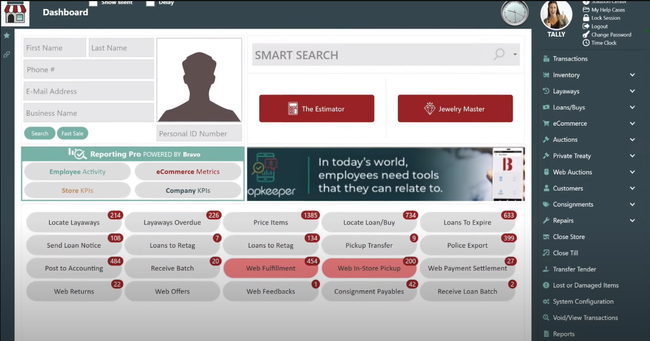
- Customizable to pawnbroker needs
- Real-time store performance dashboard
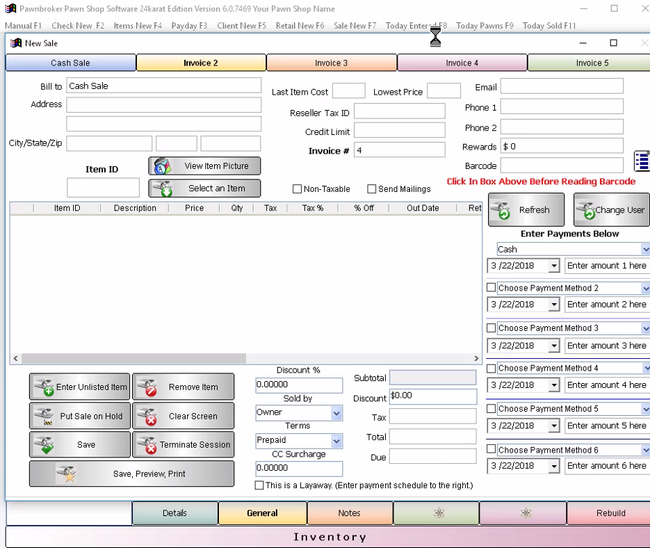
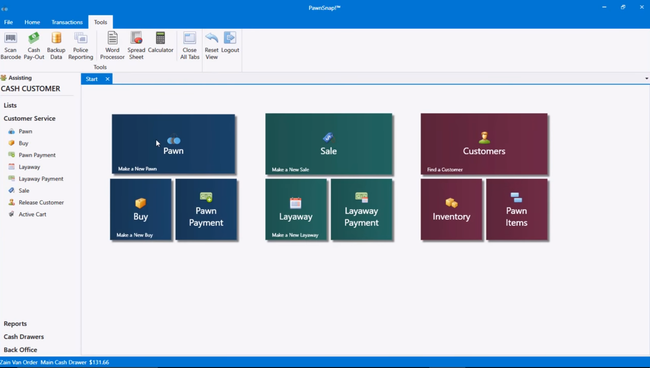
In this guide, we’ve ranked the best platforms based on their ability to automate compliance and manage retail sales, loans, and firearm regulations.
- Bravo POS: Best Overall
- Pawnbroker: Best Employee Access Control
- PawnSnap: Best Firearm Compliance Tools
Bravo POS - Best Overall
The inventory management system in Bravo POS helps you manage items fluctuating between statuses, from retail inventory, layaways, and consignments to loan collateral and forfeited goods. It goes beyond basic POS tools, letting you easily track all forfeited assets by an itemized, filterable list. Plus, you can move items between statuses and even search by custom date ranges or item types for quick audits.
Bravo also includes redemption and layaway tracking, so you can easily see which items are pending pickup, still redeemable, or have completed their lifecycle. For high-demand items, you can trigger text alerts. Just tie inventory events to the customer management module; if a certain item becomes available, the system sends out automated SMS notifications to interested customers.
Additionally, Bravo includes strong security integrations. Each item entry includes image capture and serial number tracking, and you can link them to anti-theft alert systems like Eyeson Digital. Unfortunately, you’ll need a custom quote to determine exact prices.
Pawnbroker - Best Employee Access Control
Pawnbroker Pawn Shop Software’s Diamond Edition includes a layered employee control system that provides several critical features:
- Restrict specific functions like voids, editing financial records, and discounts.
- Assign individual logins with permissions tailored to each employee’s role.
- Audit individual tills to easily spot discrepancies between expected and actual cash.
- Track commissions automatically by employee to keep performance metrics and payouts transparent.
Overall, this helps prevent employee fraud, such as unauthorized voids or off-the-books discounts. However, these controls are only available in the Diamond Edition, which starts at $895 per user (one-time). The entry-level edition, priced at $495 per user, does not include these features. Additional software copies can be installed on multiple computers for $399 each.
PawnSnap - Best Firearm Compliance Tools
PawnSnap’s digital gun book tools automate the entire transaction workflow when managing high-risk, highly regulated firearms. Its compliance suite includes an integrated ATF Form 4473 (e4473) that customers can complete digitally in-store. The system cross-checks their address against what’s on file and stores all completed e4473s securely in the cloud for a centralized audit trail.
This pawn shop software also includes serial number double-entry verification, so you’ll catch any typos or misreads before finalizing a transaction. It also provides a printed and PDF gun log (A&D book) that updates real-time gun acquisition and disposition records. For disposition controls, sales trigger checks like FFL transfers and background check holds to ensure you always meet the latest ATF rules.
Additionally, PawnSnap stores detailed item-level metadata, such as importer, manufacturer, serial number, and caliber, and stores it for each transaction. It even has state-specific support for CAPSS (California), FES (Florida), and other background check systems.
What is Pawn Shop Software?
Pawn shop software primarily handles point of sale, record keeping, and inventory management. Pawn shops need to keep detailed records of every transaction and item brought in. These records will be sent as police reports to cross-check for stolen items.
Pawn shops also have the unique challenge of holding collateral items in exchange for loans. After a specified period of time, if the loan is not paid back in full, the item is put up for sale. Pawn shop software’s inventory management keeps track of whether or not the item is sellable and how long it has been held. When the grace period is up, the item will be made available for purchase.
Features of Pawn Shop Software
| Feature | Description |
|---|---|
| POS | Process payments, print receipts, create price quotes, and apply discounts. |
| ID Scanning | Upload and store photo ID of buyers and sellers for record keeping. |
| Police Reporting | Collect photo identification, residence information, and merchandise information to include in the police reports. |
| Inventory Management | Track sellable items and layaway items, as well as items held as collateral. |
| eCommerce] | Allow customers to purchase sellable items through your website. |
| Check Cashing | Real-time check verification and fraud detection, bad check reporting, and secure check depositing. |
Pawn Shop POS
Pawn shop software handles core point of sale functionalities like payment processing, receipting, and transaction tracking. POS systems also have features unique to pawn shops including:
- Integration with Google and reselling sites like eBay and Amazon. This allows you to create accurate price quotes based on resale value.
- Automated notifications to targeted customers if a wanted item is brought in or made available.
- Discounting based on how long inventory has been available to improve turnover.
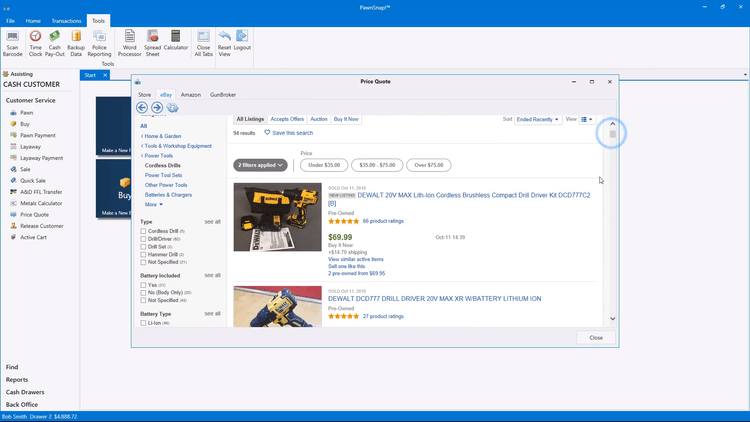
Police Reporting and ID Scanning
Pawn shops are required by state and local laws to report items you purchase. Templates within the software make it easy to put together reports with all required information. You only need to upload a scanned image of a photo ID and enter in additional details. Depending on your municipality, you’ll need the address, phone number, and photo of the seller. A detailed description of the product, as well as an image of it, is also important to include. In some cases, you need a social security number or fingerprint.
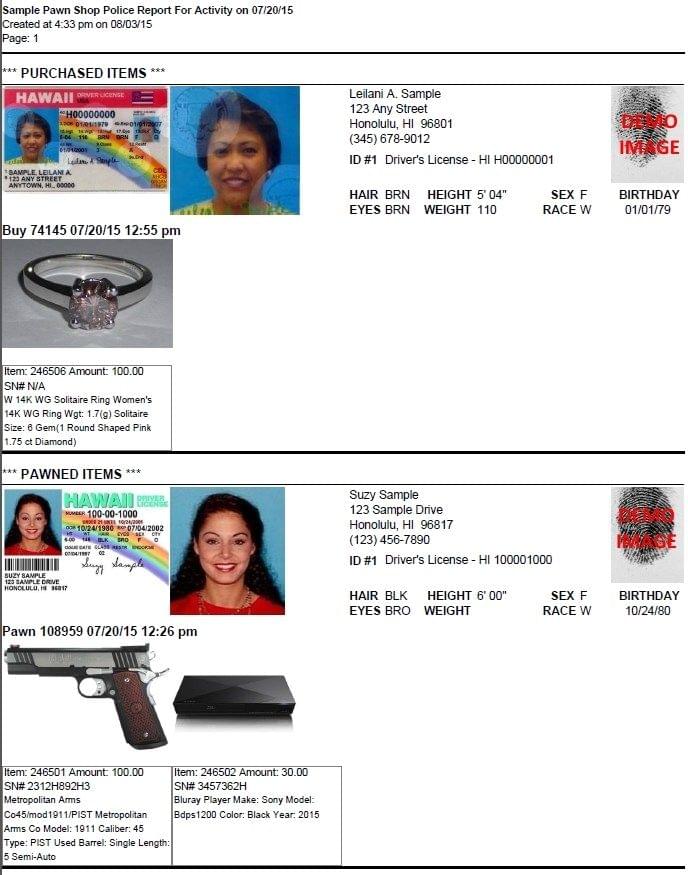
Inventory Management
Unlike general retail stores, pawn shops don’t have a predefined inventory to stock. The inventory comes from customers that sold the item outright. An item will also be sold if it is used as collateral and the loan isn’t paid back. Pawn shop management systems track how long an item has been in your possession before adding it to available inventory. Most items are held for an average of 30 days before being put on the market.
Pawn software also helps manage layaways. Pawn shops that offer layaway services require down payments and/or monthly payments. This prevents inventory items being held for an indefinite amount of time. The system will keep track of payments made towards the item. You will be notified of missed payments to prevent losing money on unsold inventory.
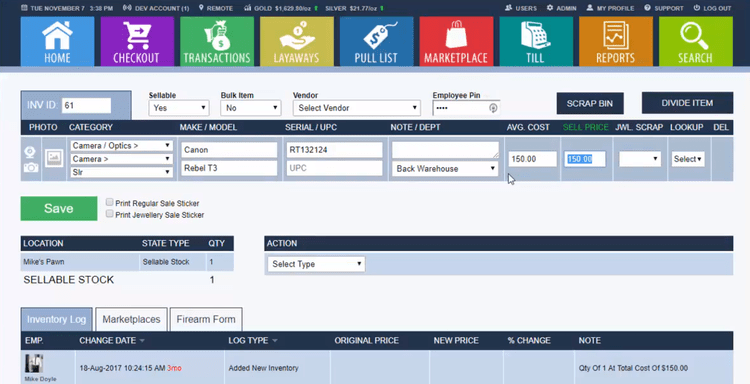
Price of Pawn Shop Software
Pawn shop software averages between $495 and $995 over the course of one year. Prices change depending on features and user licenses you need. For instance, driver’s license scanning, barcode printing, and real-time cash drawer auditing features are found in higher-priced plans.
Many software vendors also charge extra for customer support and installation. Keep in mind that additional POS hardware may need to be purchased with some solutions as well.
Free Pawn Shop Software
Currently, there aren’t any free software programs specifically designed for pawn shops. Most pawn shop software is considered too complex to be completely free. Some temporary free trials are available depending on the software company.
If you have a very small number of transactions every month, sticking with Excel and a basic accounting solution like QuickBooks could work.












